情态动词shall,should, must 用法及练习
情态动词的用法
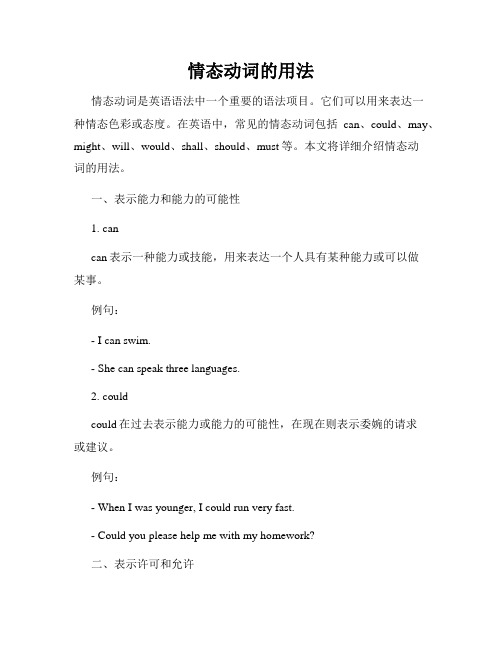
情态动词的用法情态动词是英语语法中一个重要的语法项目。
它们可以用来表达一种情态色彩或态度。
在英语中,常见的情态动词包括can、could、may、might、will、would、shall、should、must等。
本文将详细介绍情态动词的用法。
一、表示能力和能力的可能性1. cancan表示一种能力或技能,用来表达一个人具有某种能力或可以做某事。
例句:- I can swim.- She can speak three languages.2. couldcould在过去表示能力或能力的可能性,在现在则表示委婉的请求或建议。
例句:- When I was younger, I could run very fast.- Could you please help me with my homework?二、表示许可和允许may表示请求和征求允许的委婉方式。
例句:- May I borrow your pen, please?- May I ask you a question?2. cancan表示许可和允许,与may往往可以互换使用。
例句:- Can I have another piece of cake?- Can I go to the party tonight?三、表示可能性和推测1. maymay表示对某事发生的可能性的推测。
例句:- It may rain tomorrow.- He may be late for the meeting.2. mightmight表示对某事发生的低可能性的推测。
- I might travel abroad next year.- He might not come to the party.四、表示义务和必要性1. mustmust表示义务和必要性,强调说话人的主观判断。
例句:- You must finish your homework before going out.- We must be at the airport by 8 o'clock.2. have tohave to表示外部的义务和必要性,比must更加客观。
法律英语翻译中情态动词的用法

法律英语翻译中情态动词的用法法律英语翻译情态动词用法shall和shouldshall在合同文件中是使用频率最高的词,在合同文件中shall表示强制性承担法律或合同所规定的义务,在表达"应该"或"必须"做某事时,应用"shall"而不能用" must"或"should",但有时可用"will",力度比shall 弱。
Should在法律文件中往往作"if"解,只表示"如果"之意。
如:The board meeting shall be called and presided over by the Chairman. Should the chairman be absent, the vice-Chairman shall, in principle, call and preside over the board meeting.文中:两个shall,都表示有责任做,应该做之意。
Should: If 表示如果。
board meeting:董事会会议。
preside over:主持。
原文可译为:董事会会议应由董事长召集、主持;如董事长缺席,原则上应由副董事长召集、主持。
shall, may和must的否定句Shall在法律条文、合同条款处在两种情况下可以不译外,主要可以被译成"须"、"应"和"应当"等。
但shall与not或其他否定形式(如用否定词No/neigher开头的句子)连用时,一般不能顺其自然,译成"不须"、"不应"或"不要"、"不可"、"不应当",因为这几个词的意思在汉语里主要表示"建议"或"忠告";在语用上,口语色彩较重,表示"禁止"的语气不够强烈;大量既定的权威性文献表明:shall not及类似否定式短句的最通常、最恰当的译法是"不得",因为"不得"在汉语里与"禁止"一词同义,与法律英语中含shall的否定句所要表达的意思相同。
试看以下各例:1.The rights and freedoms enjoyed by Hong Kong residents shall not be restricted unless as prescribed by law. Such restrictions shall not contravene the provisions of the preceding paragraph of this Article.香港居民享有的权利和自由,除依法规定外不得限制,此种限制不得与本条第一款规定抵触。
情态动词的用法及其表达的意义
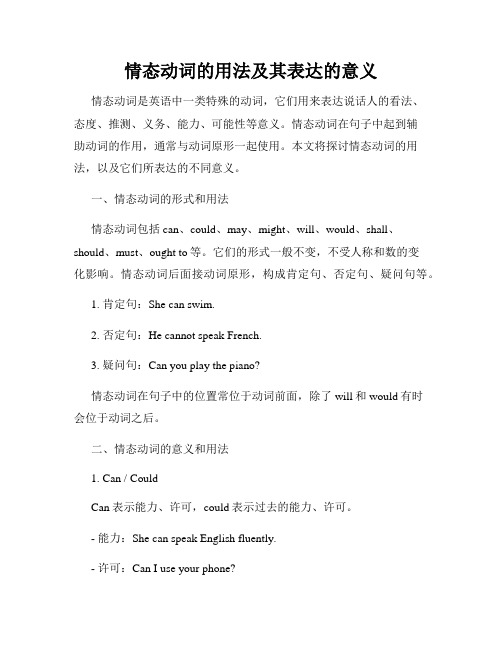
情态动词的用法及其表达的意义情态动词是英语中一类特殊的动词,它们用来表达说话人的看法、态度、推测、义务、能力、可能性等意义。
情态动词在句子中起到辅助动词的作用,通常与动词原形一起使用。
本文将探讨情态动词的用法,以及它们所表达的不同意义。
一、情态动词的形式和用法情态动词包括can、could、may、might、will、would、shall、should、must、ought to等。
它们的形式一般不变,不受人称和数的变化影响。
情态动词后面接动词原形,构成肯定句、否定句、疑问句等。
1. 肯定句:She can swim.2. 否定句:He cannot speak French.3. 疑问句:Can you play the piano?情态动词在句子中的位置常位于动词前面,除了will和would有时会位于动词之后。
二、情态动词的意义和用法1. Can / CouldCan表示能力、许可,could表示过去的能力、许可。
- 能力:She can speak English fluently.- 许可:Can I use your phone?Could也可以用于表示请求或委婉的建议:- 请求:Could you please help me with my luggage?- 建议:You could try the new restaurant in town.2. May / MightMay表示许可、可能性,might表示过去或将来的可能性。
- 许可:May I borrow your pen?- 可能性:I may go to the party tonight.Might也可以用于表示不太可能的情况:- 不太可能:He might not come to the meeting.3. Will / WouldWill表示意愿、预测,would表示过去的意愿、假设。
- 意愿:I will help you with your project.- 预测:It will rain tomorrow.Would也可以用于表示委婉的请求或建议:- 请求:Would you mind closing the window?- 建议:You would feel better if you took a break.4. Shall / ShouldShall通常用于第一人称,表示建议、义务,should则表示建议、期望。
情态动词的用法区别学会区分情态动词的不同用法

情态动词的用法区别学会区分情态动词的不同用法情态动词的用法区别情态动词是一类特殊的动词,用来表示说话人对某种动作或状态的态度、愿望、能力或推测等情态,在句子中起到限制、修饰其他动词或表达说话人的意愿的作用。
在英语中,常见的情态动词包括can、could、may、might、shall、should、will、would、must等。
理解和正确运用情态动词,对于学习英语的学生来说非常重要。
本文将从情态动词的用法区别展开讨论,帮助读者更好地掌握这一语法知识。
一、表示能力和许可的区别1. can与could的区别can和could都表示能力,但在用法上有一些区别。
can用于一般现在时,表示现在或将来的某种能力,而could则用于一般过去时,表示过去的能力。
例如:He can speak English fluently.(他能说流利的英语。
)He could swim when he was young.(他小时候会游泳。
)此外,could还可用于表示一种委婉的请求或许可。
例如:Could you please pass me the salt?(请你把盐递给我好吗?)2. may与might的区别may与might都表示许可,但may更常用于正式场合,might更常用于非正式场合,且might更加委婉。
例如:May I use your computer?(我可以用你的电脑吗?)Might I borrow your pen? (我能借你的笔用一下吗?)二、表示推测和可能性的区别1. must与may的区别must和may都用于表示推测和可能性,但语气上有一定的差异。
must表示说话人的推测非常肯定,有把握,而may则表示说话人的推测不那么肯定。
例如:She must be tired because she worked all day.(她一定很累,因为整天都在工作。
)She may be tired because she worked all day.(她可能很累,因为整天都在工作。
情态动词的用法及练习(附答案)

情态动词的用法及专项练习第1 & 2类:词形词的含义例句can ①“能力”②“允许”③“可能性”(0%)④“请求”I can speak English.Can I go to the toilet.It can’t be Susan. She is in Paris. Can you help me?could ①“过去的能力”②“过去的允许”③“可能性”(30%)④“请求”, 比can更客气⑤“建议”⑥“将来的一种可能性”She could speak English When she was 5 years old. Could I borrow your dictionary?It could get much colder in January.Could you please say that again more slowly.We could try to fix it ourselves.I think we could go to war again.be able to “能力”= can, 但比can的时态更具多样性。
can无法表达的时态,用be able to表达。
She will be able to teach English. (一般将来时)She was able to talk when she was 2 years old. (一般过去时)I would love to be able to play the piano. (动词不定式)may ①“请求、允许”(比较礼貌)②“将来的可能性”(50%)③may 在更多的时态中经常May I come in?It may rain tomorrow.第1类:十大情态动词can / could / may / might / must / ought to / shall / should / will / would 第2类:半情态词及充当情态动词的词had better / be able to / have to / used to / need / dare用be allowed to来代替might “较小的可能性”(≤30%)I might move to Canada some day.must ①“必须”(责任、义务)②“可能性”(推测) (100%)③“禁止”(否定式) Everyone must pay taxes.She didn’t arrive. She must be sick.You mustn’t p l ay with fire. It’s dangerous.have to ①“必须、不得不”(客观上不得不做)②多种时态里面代替“must”,因must只有一般现在,但have to 可以有多种时态。
情态动词should,may must等用法

Should的用法:1.(shall的过去式,表示过去将来)将会We hoped that we should be able to do that. 我们希望我们能这样做。
★2. should 作为情态动词,可以用在条件状语从句中,表示语气较强的假设,译作“万一”,这时也可将should 置于从句之首,即将should 放在主语前面,而省略从属连词if .例如:◆If you should fail to come,ask Mrs Chen to work in your place. (= Should you fail to come,ask Mrs Chen to work in your place. )万一你来不了,就叫陈夫人代替你。
◆If anyone should come,say I am not at home. (= Should anyone come,say I am not at home. )万一有人来访,就说我不在家。
◆If it should rain tomorrow,I wouldn't go.(= Should it rain tomorrow,I wouldn't go.)◆If the car should break down on the way, you would haveto walk back.◆Ask her to ring me up if you should see her.万一汽车中途抛锚,你就得走回来。
★3.(表示可能性、推测、推论或期待)可能;(按理)应该She should be here any minute.她该马上就到。
Dinner should be ready by now.此刻晚饭应该做好了。
★4.(表示义务、责任)应该,应当You should do as she says.你应当照她说的去做。
知识点情态动词的用法与意义
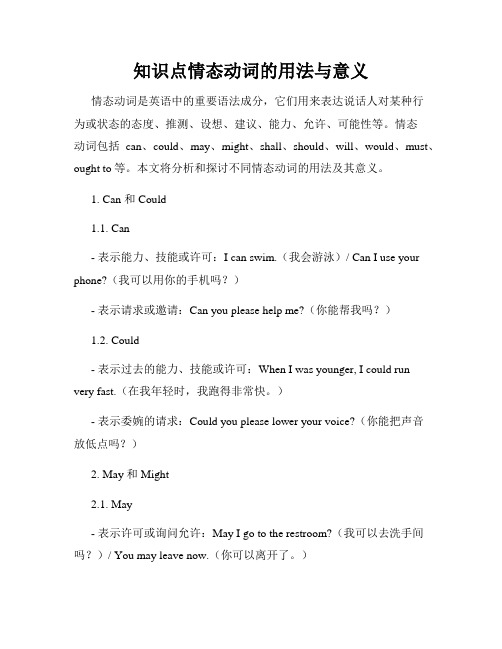
知识点情态动词的用法与意义情态动词是英语中的重要语法成分,它们用来表达说话人对某种行为或状态的态度、推测、设想、建议、能力、允许、可能性等。
情态动词包括can、could、may、might、shall、should、will、would、must、ought to等。
本文将分析和探讨不同情态动词的用法及其意义。
1. Can 和 Could1.1. Can- 表示能力、技能或许可:I can swim.(我会游泳)/ Can I use your phone?(我可以用你的手机吗?)- 表示请求或邀请:Can you please help me?(你能帮我吗?)1.2. Could- 表示过去的能力、技能或许可:When I was younger, I could run very fast.(在我年轻时,我跑得非常快。
)- 表示委婉的请求:Could you please lower your voice?(你能把声音放低点吗?)2. May 和 Might2.1. May- 表示许可或询问允许:May I go to the restroom?(我可以去洗手间吗?)/ You may leave now.(你可以离开了。
)- 表示推测或可能性:He may be late.(他可能会迟到。
)2.2. Might- 表示推测或可能性,语气比may更弱:She might know the answer.(她可能知道答案。
)- 表示委婉的建议或请求:Might I suggest a different approach?(我可以建议一种不同的方法吗?)3. Will 和 Would3.1. Will- 表示意愿、决心或承诺:I will help you.(我会帮助你。
)/ I will be there at 8 p.m.(我将在晚上8点到达。
)- 表示预测或推测:It will rain tomorrow.(明天会下雨。
初中英语情态动词之shall和should的正确用法

初中英语情态动词之shall和should的正确用法相信很多同学对于shall和should的用法比较容易搞混,下面是小编为您收集整理的shall和should的正确用法,供大家参考!初中英语情态动词之shall和should的正确用法1、shall的用法(1)shall用于第一、三人称陈述句中,表示说话人征求对方的意见或向对方请示。
(2)shall用于第二、第三人称陈述句中,表示说话人给对方的命令、警告、允诺或威胁。
(3)用于所有人称,表示规章、法令、预言等,可译为“必须”。
2、should的用法(1)表示义务、责任或劝告、建议、命令等,意为“应该”。
(2)表示有一定根据的推测、推论或可能性,意为“可能,该”(肯定的语气没有must表推测时强)。
(3)多用于疑问句中,表示惊讶、难以相信或不应该的事。
(4)ought to和should的比较A、ought to也可以表示推论、可能性,和should用法一样。
B、在省略回答中,ought to中的to可以省略。
C、should和ought to表示做正确的事情或理应做的事情。
be supposed to 意为“被期望,应该”,表示被期望发生或根据安排、要求做某事,或认为做某事是正常的。
英语语法速记口诀大汇总一、冠词基本用法【速记口诀】名词是秃子,常要戴帽子,可数名词单,须用a或an,辅音前用a, an在元音前,若为特指时,则须用定冠,复数不可数,泛指the不见,碰到代词时,冠词均不现。
【妙语诠释】冠词是中考必考的语法知识之一,也是中考考查的主要对象。
以上口诀包括的意思有:①名词在一般情况下不单用,常常要和冠词连用;②表示不确指的可数名词单数前要用不定冠词a或an,确指时要用定冠词the;③如复数名词表示泛指,名词前有this,these,my,some等时就不用冠词。
二、名词单数变复数规则【速记口诀】单数变复数,规则要记住,一般加s,特殊有几处:/t?蘩/、/?蘩/、/s/结尾,es不离后,末尾字母o,大多加s,两人有两菜,es不离口,词尾f、fe,s前有v和e;没有规则词,必须单独记。
(完整版)情态动词用法及其练习与答案
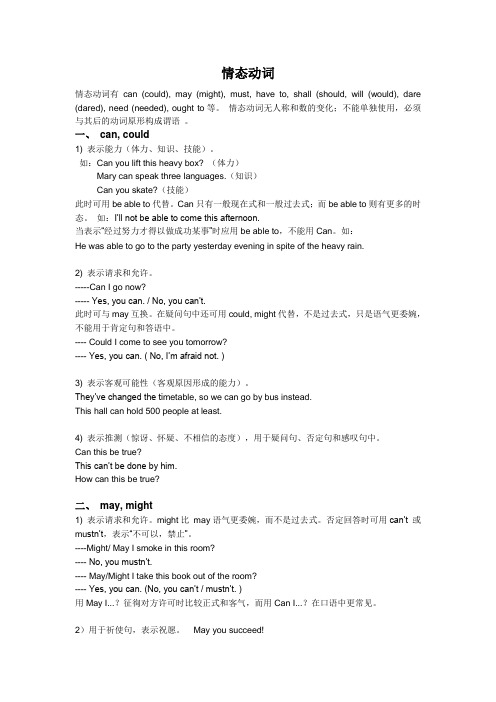
情态动词情态动词有can (could), may (might), must, have to, shall (should, will (would), dare (dared), need (needed), ought to等。
情态动词无人称和数的变化;不能单独使用,必须与其后的动词原形构成谓语。
一、can, could1) 表示能力(体力、知识、技能)。
如:Can you lift this heavy box? (体力)Mary can speak three languages.(知识)Can you skate?(技能)此时可用be able to代替。
Can只有一般现在式和一般过去式;而be able to则有更多的时态。
如:I’ll not be able to come this afternoon.当表示“经过努力才得以做成功某事”时应用be able to,不能用Can。
如:He was able to go to the party yesterday evening in spite of the heavy rain.2) 表示请求和允许。
-----Can I go now?----- Yes, you can. / No, you can’t.此时可与may互换。
在疑问句中还可用could, might代替,不是过去式,只是语气更委婉,不能用于肯定句和答语中。
---- Could I come to see you tomorrow?---- Yes, you can. ( No, I’m afraid not. )3) 表示客观可能性(客观原因形成的能力)。
They’ve changed the ti metable, so we can go by bus instead.This hall can hold 500 people at least.4) 表示推测(惊讶、怀疑、不相信的态度),用于疑问句、否定句和感叹句中。
情态动词用法总结归纳
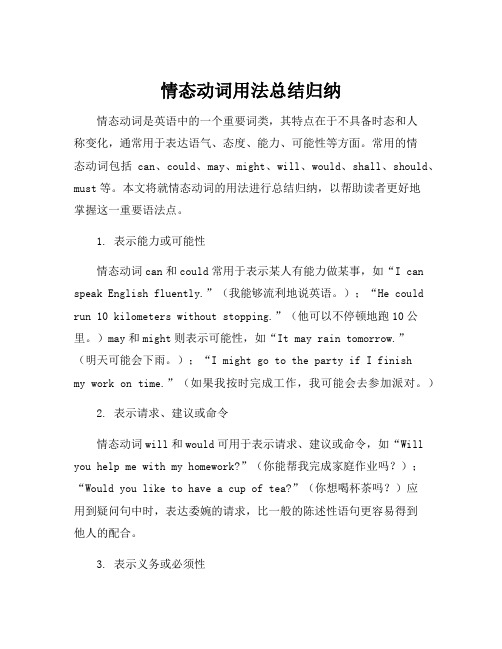
情态动词用法总结归纳情态动词是英语中的一个重要词类,其特点在于不具备时态和人称变化,通常用于表达语气、态度、能力、可能性等方面。
常用的情态动词包括can、could、may、might、will、would、shall、should、must等。
本文将就情态动词的用法进行总结归纳,以帮助读者更好地掌握这一重要语法点。
1. 表示能力或可能性情态动词can和could常用于表示某人有能力做某事,如“I can speak English fluently.”(我能够流利地说英语。
);“He could run 10 kilometers without stopping.”(他可以不停顿地跑10公里。
)may和might则表示可能性,如“It may rain tomorrow.”(明天可能会下雨。
);“I might go to the party if I finishmy work on time.”(如果我按时完成工作,我可能会去参加派对。
)2. 表示请求、建议或命令情态动词will和would可用于表示请求、建议或命令,如“Will you help me with my homework?”(你能帮我完成家庭作业吗?);“Would you like to have a cup of tea?”(你想喝杯茶吗?)应用到疑问句中时,表达委婉的请求,比一般的陈述性语句更容易得到他人的配合。
3. 表示义务或必须性情态动词must和should则表示义务或必须性,如“I mustfinish my project by Friday.”(我必须在周五完成我的项目。
);“You should eat more vegetables.”(你应该多吃蔬菜。
)值得注意的是,must常用于表示说话人的主观判断或要求,而should则表示客观上的合理建议或道义上的规范。
4. 表示推测或推论情态动词may、might和could亦可用于表示推测或推论,如“It may snow in the evening.”(晚上可能会下雪。
情态动词用法

情态动词can, could, may, might, will, would, shall, should, must, can’t 等的用法。
1) can /couldJin can speak English well. (ability)Could you please show me the way to Beihai Park? (request)2) may /mightMay we see the awards for the teams? (permission; request)She might give you some new clothing. (possibility)3) will /wouldThe Spring Festival is the most fun. The whole family will come for dinner. (promise;agreement)Often he would dress up like a rich man. (past habit; custom)4) shall /shouldThe harvest festival begins on Saturday. We shall be there with our friends. (promise;agreement)You should arrive at the airport two hours before he goes. (advice)5) must /can’tWang Feng wins an award every year. He must be very strong (speculation)You must be joking. That can’t be true. (guessing)Teaching procedure:Period 1.Contents: Warming up & reading comprehensionStep 1.Warming upAim: Make students get to know something about water.Step 2. Pre-reading1.Show some pictures of making electricity, irritating in agriculture, transport by ships, etc,.2. group work:How is the water being used?Step 3. While-reading1.Scanning: Ss read scan the bold words in the passage and understand the structure of the passage.How many parts are there in the passage?2.Ss read and get the main ideas of each part.Part 1(para1): the properties of water;Part2(Para2): chemical structure of water---H2OPart3(Para3): salinity----- the percentage of salt.Part4(Para4): DensityPart5(Para5): heat capacityPart6(Para6-7) Ocean motionStep 4. After-readingFinish the post-reading Ex on P21.Step 5. Assignment1. surf the internet and get more information about water and ocean using search engines like yahoo or baidu. ( or just input the key words like Jules Verne into the address column of IE)2. discussion:What will you prepare for writing an explanation of corals?After discussion, work out an outline.Period 2.Contents: difficulties in the passage.Step 1. Warming upAsk some Ss to present their homework.Step 2. Learning about the language:Play the tape for students to follow.Teacher explain some language points in the text on page 19--20.1. Who benefits from using water in this way?Benefit…from/ by…This song reminds me of France.Remind me to answer the letter.I reminded her that the book would cost her much.2. Life in the oceans ranges from the tiniest plankton all the way to giant like sharks andwhales.Range from… to…/ range between …. And…. 意为“从。
情态动词(包括情态动词的基本用法及其推测含义,虚拟语气)

情态动词的用法情态动词有can (could), may (might), must, have to, shall (should), will (would), dare (daren’t,dared), need (needn’t,needed), ought to,used to等。
情态动词无人称和数的变化;不能单独使用 ,必须与其后的动词原形构成谓语。
可以有推测意义 ,也可以没有推测意义。
不同的“肯定〞程度可按以下层次排列:1.He is at home. (事实)2.He must be at home.〔非常肯定的推断〕3.He could be at home.〔很可能〕4.He ought to be at home.〔很可能〕5.He may be at home.〔仅仅可能而已〕6.He might be at home.〔或许, 非常不确定〕7.He might not be at home.〔也许不在家〕 8.He may not be at home.〔比might可能〕9.He couldn’t be at home.〔很可能不在家〕10.He can’t be at home.〔一定不在家〕一、can, could(1).can 的用法1.能力(能做某事): Two eyes can see more than one.2.表示客观可能性〔客观原因形成的能力〕〔可以 ,可能〕。
1) They’ve changed the timetable, so we can go by bus instead.2) This hall can hold 500 people at least.3.一时的可能性(有时可能) Children can be very trying(令人厌烦的;难受的).4.同意、允许(可以) Can I come in?在这里can 和may的意思差不多。
情态动词shall
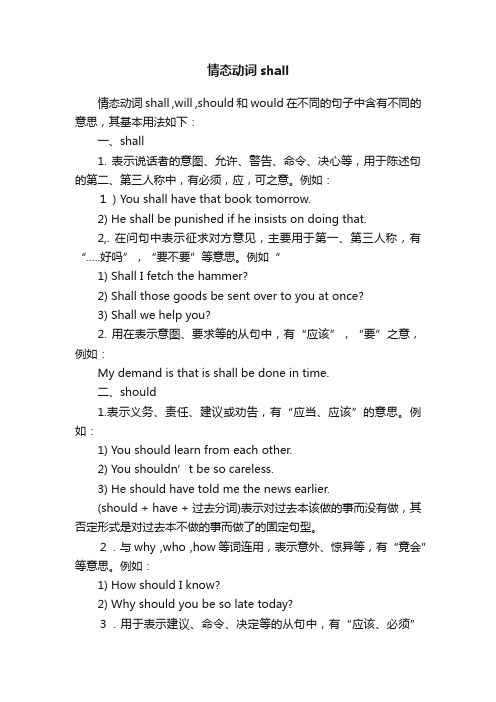
情态动词shall情态动词shall ,will ,should和would 在不同的句子中含有不同的意思,其基本用法如下:一、shall1. 表示说话者的意图、允许、警告、命令、决心等,用于陈述句的第二、第三人称中,有必须,应,可之意。
例如:1)You shall have that book tomorrow.2) He shall be punished if he insists on doing that.2,. 在问句中表示征求对方意见,主要用于第一、第三人称,有“…..好吗”,“要不要”等意思。
例如“1) Shall I fetch the hammer?2) Shall those goods be sent over to you at once?3) Shall we help you?2. 用在表示意图、要求等的从句中,有“应该”,“要”之意,例如:My demand is that is shall be done in time.二、should1.表示义务、责任、建议或劝告,有“应当、应该”的意思。
例如:1) You should learn from each other.2) You shouldn’t be so careless.3) He should have told me the news earlier.(should + have + 过去分词)表示对过去本该做的事而没有做,其否定形式是对过去本不做的事而做了的固定句型。
2.与why ,who ,how等词连用,表示意外、惊异等,有“竟会”等意思。
例如:1) How should I know?2) Why should you be so late today?3.用于表示建议、命令、决定等的从句中,有“应该、必须”的意思。
例如:1) The young doctor proposed that he should try the experiment on himself.2) It was decided that we should start a cleanup at once.4。
2021届 高中英语语法--情态动词复习+练习含答案
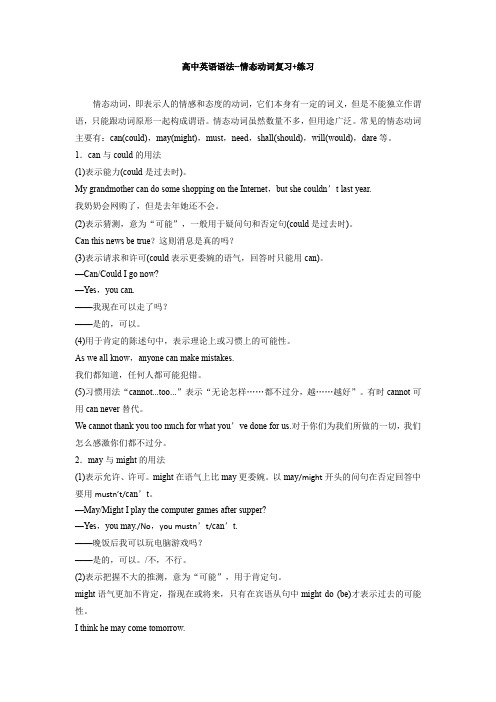
高中英语语法--情态动词复习+练习情态动词,即表示人的情感和态度的动词,它们本身有一定的词义,但是不能独立作谓语,只能跟动词原形一起构成谓语。
情态动词虽然数量不多,但用途广泛。
常见的情态动词主要有:can(could),may(might),must,need,shall(should),will(would),dare等。
1.can与could的用法(1)表示能力(could是过去时)。
My grandmother can do some shopping on the Internet,but she couldn’t last year.我奶奶会网购了,但是去年她还不会。
(2)表示猜测,意为“可能”,一般用于疑问句和否定句(could是过去时)。
Can this news be true?这则消息是真的吗?(3)表示请求和许可(could表示更委婉的语气,回答时只能用can)。
—Can/Could I go now?—Yes,you can.——我现在可以走了吗?——是的,可以。
(4)用于肯定的陈述句中,表示理论上或习惯上的可能性。
As we all know,anyone can make mistakes.我们都知道,任何人都可能犯错。
(5)习惯用法“cannot...too...”表示“无论怎样……都不过分,越……越好”。
有时cannot可用can never替代。
We cannot thank you too much for what you’ve done for us.对于你们为我们所做的一切,我们怎么感激你们都不过分。
2.may与might的用法(1)表示允许、许可。
might在语气上比may更委婉。
以may/might开头的问句在否定回答中要用mustn’t/can’t。
—May/Might I play the computer games after supper?—Yes,you may./No,you mustn’t/can’t.——晚饭后我可以玩电脑游戏吗?——是的,可以。
shall和should的用法
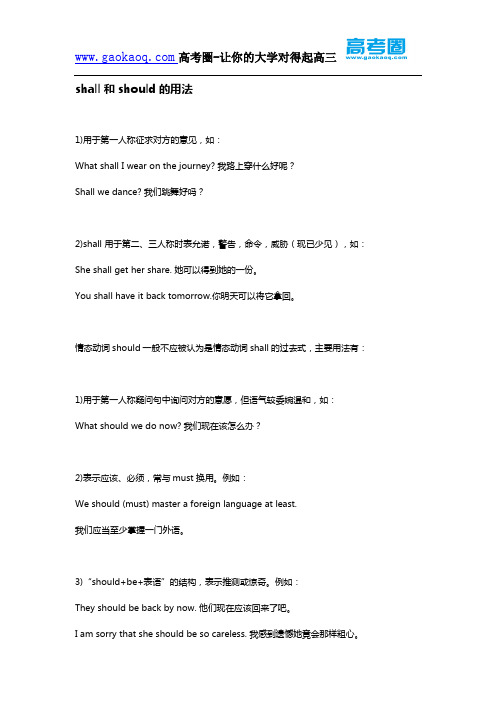
shall和should的用法1)用于第一人称征求对方的意见,如:What shall I wear on the journey? 我路上穿什么好呢?Shall we dance? 我们跳舞好吗?2)shall 用于第二、三人称时表允诺,警告,命令,威胁(现已少见),如:She shall get her share. 她可以得到她的一份。
You shall have it back tomorrow.你明天可以将它拿回。
情态动词should一般不应被认为是情态动词shall的过去式,主要用法有:1)用于第一人称疑问句中询问对方的意愿,但语气较委婉温和,如:What should we do now? 我们现在该怎么办?2)表示应该、必须,常与must 换用。
例如:We should (must) master a foreign language at least.我们应当至少掌握一门外语。
3)“should+be+表语”的结构,表示推测或惊奇。
例如:They should be back by now. 他们现在应该回来了吧。
I am sorry that she should be so careless. 我感到遗憾她竟会那样粗心。
4)“should+have+过去分词”的结构,表示过去该做而实际上尚未做的动作或行为;其否定则表示发生了不应该发生的行为。
其同义结构“ought to have +过去分词”,表示过去“早应该”、“本当”之意,语气较强。
例如:I should have thought of that. 这一点我是应当想到的。
(但没想到)They should not have left so soon.他们不应当走得这么早。
(但已走了)5) 在“It is natural (strange, natural, necessary, surprised, impossible, important ) that……”句型中,主语从句中的谓语动词要用should +动词原形”表示“理所当然”、“奇怪”、“必要”、“惊异”等的意思。
情态动词shall_should__must_用法及练习

• 2) 肯定推测,“一定,准是”(只能用于 肯定句)
• 1. She must be tired after such a long walk. • 2. He must be sleeping now.
• ---Hi, Tom. Any idea where Jane is? • ---She _____ in the classroom. I saw her there just now. A shall be B should have been C must be D might have been
3. must 表示固执,不满,意为“偏偏,偏
要,非得”
•---- May I smoke here? ---- If you __, choose a seat in the smoking section. A. should B. could C. may D. must
John, look at the time, __ you play the piano at such a late hour? A. Must B. Can C. May D. Need
(2).表示愿意,宁愿,肯
a) He would eat nothing b) I told him not to go, but he would not listen c) He would do in spite of our warnings.
(3).表示假想的愿望.(但愿, 要是...多好/虚 拟) a) We wish that he would come again. b) It would be good if I could fly!
Modal verbs
shall和should的用法
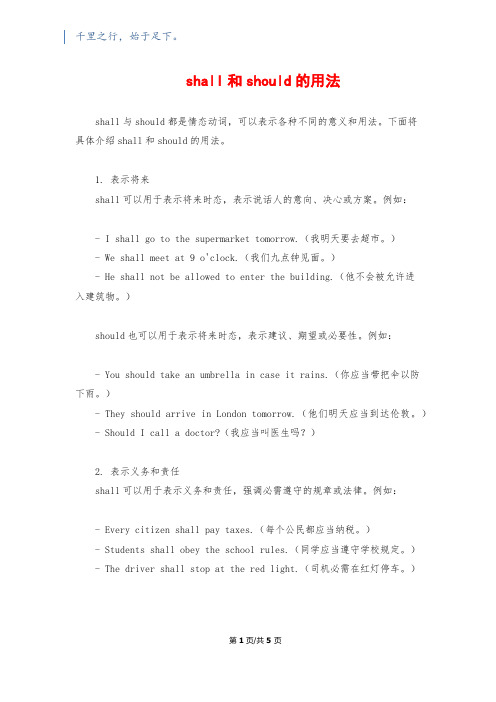
shall和should的用法shall与should都是情态动词,可以表示各种不同的意义和用法。
下面将具体介绍shall和should的用法。
1. 表示将来shall可以用于表示将来时态,表示说话人的意向、决心或方案。
例如:- I shall go to the supermarket tomorrow.(我明天要去超市。
)- We shall meet at 9 o'clock.(我们九点钟见面。
)- He shall not be allowed to enter the building.(他不会被允许进入建筑物。
)should也可以用于表示将来时态,表示建议、期望或必要性。
例如:- You should take an umbrella in case it rains.(你应当带把伞以防下雨。
)- They should arrive in London tomorrow.(他们明天应当到达伦敦。
)- Should I call a doctor?(我应当叫医生吗?)2. 表示义务和责任shall可以用于表示义务和责任,强调必需遵守的规章或法律。
例如:- Every citizen shall pay taxes.(每个公民都应当纳税。
)- Students shall obey the school rules.(同学应当遵守学校规定。
)- The driver shall stop at the red light.(司机必需在红灯停车。
)第1页/共5页should也可以用于表示义务和责任,但一般用于较为正式和客观的场合。
例如:- You should respect your elders.(你应当敬重长辈。
)- Employees should arrive on time for work.(员工应当按时上班。
)- Customers should follow the store's return policy.(顾客应当遵守商店的退货政策。
情态动词语法讲解及练习题(2)
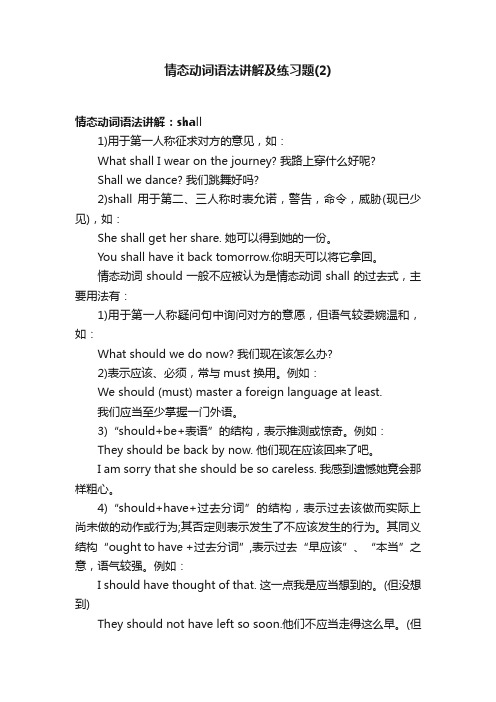
情态动词语法讲解及练习题(2)情态动词语法讲解:shall1)用于第一人称征求对方的意见,如:What shall I wear on the journey? 我路上穿什么好呢?Shall we dance? 我们跳舞好吗?2)shall 用于第二、三人称时表允诺,警告,命令,威胁(现已少见),如:She shall get her share. 她可以得到她的一份。
You shall have it back tomorrow.你明天可以将它拿回。
情态动词should一般不应被认为是情态动词shall的过去式,主要用法有:1)用于第一人称疑问句中询问对方的意愿,但语气较委婉温和,如:What should we do now? 我们现在该怎么办?2)表示应该、必须,常与must 换用。
例如:We should (must) master a foreign language at least.我们应当至少掌握一门外语。
3)“should+be+表语”的结构,表示推测或惊奇。
例如:They should be back by now. 他们现在应该回来了吧。
I am sorry that she should be so careless. 我感到遗憾她竟会那样粗心。
4)“should+have+过去分词”的结构,表示过去该做而实际上尚未做的动作或行为;其否定则表示发生了不应该发生的行为。
其同义结构“ought to have +过去分词”,表示过去“早应该”、“本当”之意,语气较强。
例如:I should have thought of that. 这一点我是应当想到的。
(但没想到)They should not have left so soon.他们不应当走得这么早。
(但已走了)5) 在“It is natural (strange, natural, necessary, surprised, impossible, important ) that……”句型中,主语从句中的谓语动词要用should +动词原形”表示“理所当然”、“奇怪”、“必要”、“惊异”等的意思。
英语语法:情态动词

英语语法:情态动词情态动词(Modal verbs)本身有一定的词义,表示语气的单词。
但是不能独立作谓语,只能和动词原形一起构成谓语。
情态动词用在行为动词前,表示说话人对这一动作或状态的看法或主观设想。
小编在这里整理了相关知识,快来学习学习吧!英语语法:情态动词一、can和could1、can的用法(1)表示体力和脑力方面的能力。
(2)表示对现在的动作或状态进行主观的猜测,主要用在否定句和疑问句中。
(3)表示可能性,理论上的可能性,意为“有时候可能会”,可用于肯定句。
(4)表示允许,意思与may接近。
(5)表示说话人的推测、怀疑、惊异、猜测或不肯定等,主要用于否定句、疑问句或感叹句中。
(6)can的特殊句型cannot…too / enough表示“无论怎么。
也不过分”。
“越。
越好”。
cannot but+ do sth.表示“不得不,只好”。
2、could的用法(1)表示能力,指的是过去时间。
(2)表示允许,指的是过去时间。
(3)表示可能,可以指过去时间,也可以指现在时间,表示语气缓和。
(4)委婉客气地提出问题或陈述看法,指的是现在时间。
主要用于疑问句,回答时用can。
3、can与could的区别can表推测时只用于否定句和疑问句(could无此限制)。
couldn’t的可能性比can’t小。
4、can与be able to的区别(1)现在时:无区别,但后者不常用。
(2)完成时;can没有完成时,此时要用have(has,had)been able to。
(3)将来时:can没有将来时,要用will be able to。
(4)过去时:could表示一般能力,was/were able to 表示在具体场合通过努力成功做成某事的能力。
二、may 和might1、may的用法(1)表示询问或说明一件事可不可以做。
(2)表示一件事或许会发生或某种情况可能会存在,通常用在肯定句和否定句中。
注意:表示可能性时,can’t语气强,表示“不可能”,may not语气弱,表示“可能不”。
英语中的情态动词用法
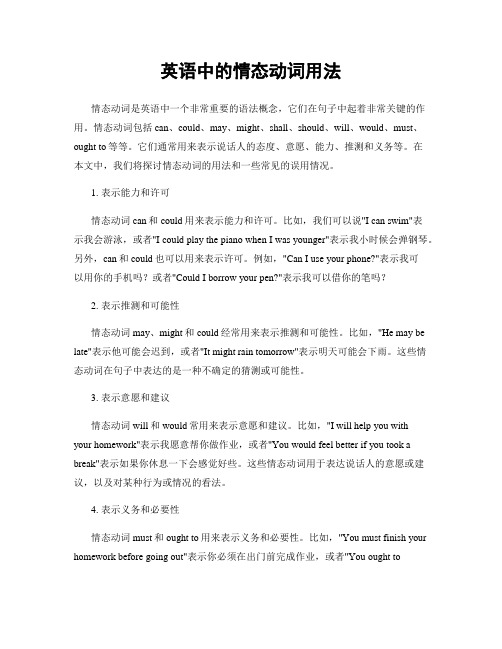
英语中的情态动词用法情态动词是英语中一个非常重要的语法概念,它们在句子中起着非常关键的作用。
情态动词包括can、could、may、might、shall、should、will、would、must、ought to等等。
它们通常用来表示说话人的态度、意愿、能力、推测和义务等。
在本文中,我们将探讨情态动词的用法和一些常见的误用情况。
1. 表示能力和许可情态动词can和could用来表示能力和许可。
比如,我们可以说"I can swim"表示我会游泳,或者"I could play the piano when I was younger"表示我小时候会弹钢琴。
另外,can和could也可以用来表示许可。
例如,"Can I use your phone?"表示我可以用你的手机吗?或者"Could I borrow your pen?"表示我可以借你的笔吗?2. 表示推测和可能性情态动词may、might和could经常用来表示推测和可能性。
比如,"He may be late"表示他可能会迟到,或者"It might rain tomorrow"表示明天可能会下雨。
这些情态动词在句子中表达的是一种不确定的猜测或可能性。
3. 表示意愿和建议情态动词will和would常用来表示意愿和建议。
比如,"I will help you withyour homework"表示我愿意帮你做作业,或者"You would feel better if you took a break"表示如果你休息一下会感觉好些。
这些情态动词用于表达说话人的意愿或建议,以及对某种行为或情况的看法。
4. 表示义务和必要性情态动词must和ought to用来表示义务和必要性。
- 1、下载文档前请自行甄别文档内容的完整性,平台不提供额外的编辑、内容补充、找答案等附加服务。
- 2、"仅部分预览"的文档,不可在线预览部分如存在完整性等问题,可反馈申请退款(可完整预览的文档不适用该条件!)。
- 3、如文档侵犯您的权益,请联系客服反馈,我们会尽快为您处理(人工客服工作时间:9:00-18:30)。
1. shall
(1)用于疑问句与第一、三人称连用,表 用于疑问句与第一、三人称连用, 用于疑问句与第一 示征求意见或请求许可。 示征求意见或请求许可。
• 1) Shall we go out for a meal together? • 2) Shall the newcomer have a try?
• --- When can I come for the
• • • • • •
photos? I need them tomorrow afternoon. --- They ___ be ready by 12:00. A. can B. should C. might D. need It’s nearly seven o’clock. Jack __ be here at any moment. A. must B. need C. should D. can
• 3. must • ---- Must I do it at once? must ---- Yes, you______. / ----No, youneedn’t _____. don’t have to) (=No, you ___________
• You mustn’t waste any more time. • You must not smoke here.
• Nothing shall stop me from going there. 决心 • You shall be sorry for what you have done, I tell you.
威胁/警告 威胁 警告
• 3.You shall get an mp5 as your birthday present this year.(允诺) • 4.The fine shall be paid in cash.
• 1. Trees are good for man. We can’t plant them _____ many. • A so B such • C too D enough • 2. In a rely race, a player can’t run fast _____. • A so B such • C too D enough
(3) must 表示固执 不满 意为“偏偏, 表示固执,不满 意为“偏偏, 不满,意为
偏要,非得” 偏要 非得” 非得
•---- May I smoke here? ---- If you __, choose a seat in the smoking section. A. should B. could C. may D. must
• There __ be any difficulty about passing the road test since you have practiced a lot in the driving school.(05 上海 上海) A. mustn’t B. shan’t C. shouldn’t D. needn’t
• 1.--- The room is so dirty .______ we clean it? • ---- Ok. • A will B Shall • C Would D Do
(2)用于肯定句与二、三人称连用,表示 用于肯定句与二、三人称连用,
允诺,决心,威胁,警告, 说话人的 允诺,决心,威胁,警告, 命令,或法律、 命令,或法律、文件的 规定 。
• 1) It’s 2:30, They should be here now. • 2) The glasses should be enough for each guest. • 3) We should arrive before dark. • 4) The roads should be less crowded today.
• 2. should • 1). Children should be devoted to their parents. • 2).You shouldn’t be so careless. ought not to
• 2)比较有依据的推测将来某种情况, )比较有依据的推测将来某种情况, • “按理说会,估计会” 按理说会,估计会”
• (3)表示惊讶、遗憾、“竟然,居然” 表示惊讶、遗憾、 竟然,居然” 表示惊讶
• I’m glad that his son should have won the first prize. • It’s strange that he should fail again. • You can’t imagine that a wellbehaved gentleman ___ be so rude to a lady. • A. might B. need C. should D. would
(规定) 规定)
• 5. Persons under 18 shall not be employed. (规定) 规定)
“The interest(利息 __ be 利息) 利息 divided into five parts, according to the agreement,” declared the judge. A.may B. should C. must D. shallay the piano at such a late hour? A. Must B. Can C. May D. Need
• 1. Why must you always break in when others are talking? • 2. If you must break the law, of course, you will be punished.
• 禁止 不可以 千万别 禁止,不可以 不可以,千万别
• 2) 肯定推测,“一定,准是”(只能用于 肯定推测, 一定,准是” 肯定句) 肯定句)
• 1. She must be tired after such a long walk. • 2. He must be sleeping now.
• ---Hi, Tom. Any idea where Jane is? • ---She _____ in the classroom. I saw her there just now. A shall be B should have been C must be D might have been
